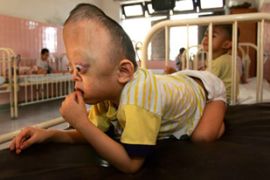Agent Orange talks begin in Hanoi
Vietnamese and US officials discuss ways to help those affected by deadly herbicide.

Clean up efforts have focused on an airport at Danang, a former US air base in central Vietnam where American troops stored, mixed and loaded Agent Orange onto aircraft during the conflict.
The two sides have already taken temporary steps to contain dioxin, the highly toxic element found in Agent Orange, at the Danang site and are now seeking ways to remove it from the soil.
A joint study in Danang found that dioxin levels were 300 to 400 times higher than internationally accepted limits.
Seven Agent Orange hot spots have been identified, according to a Canadian environmental consultant, but Vietnam says that there are as many as two dozen that need to be cleaned.
The Vietnamese government estimates that cleaning Danang and the two other most contaminated Agent Orange hot spots alone will cost $58m.
So far, the US government has contributed $8m.
Vietnam and the US are also working on joint efforts to help disabled Vietnamese whose health problems might be linked to herbicide.
Funding plea
As the meetings opened, the Vietnamese side urged the US to speed up disbursement of money to help the disabled, saying they were not receiving help quickly enough.
The United States continues to maintain that more scientific study is needed to understand the link between Agent Orange and various physical disabilities suffered by the Vietnamese who live in areas where it was used.
 |
| The US says more scientific proof is needed regarding the effects of Agent Orange [GALLO/GETTY] |
The Vietnamese say that many babies of soldiers exposed to Agent Orange have been born with terrible birth defects.
Although the two governments disagree about about likely consequences of
exposure, the two sides have agreed to work together to help those who have disabilities, regardless of the cause.
“We’re not just talking. We’re working together on concrete projects,” Michael Michalak, the US ambassador, said at the meeting.
He also called for the two sides to support “sound science” in order to make decisions about cleaning up dioxin and dealing with its “possible health impacts”.
After years of disagreement, the US and Vietnam began working together in 2006 to address problems linked with the herbicide.